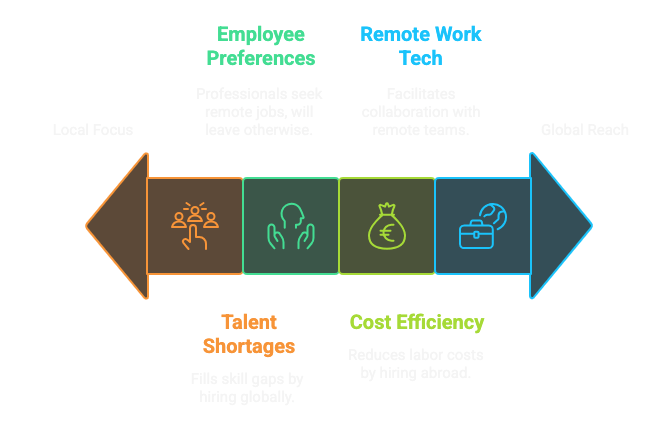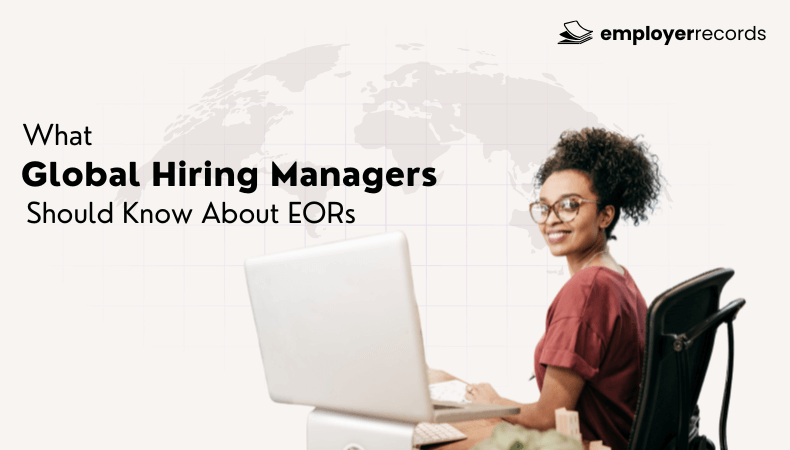Not too long ago, hiring someone in another country meant jumping through endless hoops, setting up a legal entity, figuring out foreign tax rules, and hoping you didn’t miss something that could land you in trouble. Today, things look very different.
Thanks to the rise of remote work, better tech, and a global mindset shift, companies are no longer limited by geography when it comes to hiring. Whether it’s a software engineer in Argentina or a marketing expert in the Philippines, talent is now borderless.
And one of the biggest drivers behind this shift? The rise of Employers of Record (EORs).
First, What’s a Borderless Workforce?
The term “borderless workforce” simply means a team that isn’t restricted to one location or country. You could have developers in India, designers in Poland, and customer support agents in Kenya, all working together on the same projects, across time zones.
It’s a model that’s becoming more common as businesses chase talent, speed, and cost efficiency in a global market.
But Here’s the Catch: Hiring Globally Isn’t Easy
As exciting as global hiring sounds, it’s packed with legal and logistical challenges.
- Each country has different employment laws.
- Payroll systems don’t work the same way.
- Taxes, benefits, and contracts vary widely.
- If you mess up, you risk fines, lawsuits, or reputational damage.
That’s where many companies get stuck. They want to hire globally, but don’t have the legal setup or knowledge to do it safely. This is exactly where EORs come in and make things a whole lot easier.
So, What Exactly Is an Employer of Record (EOR)?
An EOR is a third-party service that officially employs workers on behalf of your company in countries where you don’t have a legal presence.
In simple terms: you find the talent, the EOR becomes the legal employer, and you manage the work. The EOR handles all the local red tape.
Here’s what they typically take care of:
- Setting up compliant employment contracts
- Managing payroll and tax filings
- Enrolling employees in local benefits programs
- Handling statutory leave, social contributions, and insurance
- Making sure everything stays legal and above board
How EORs Are Enabling the Borderless Workforce
Let’s break down the real impact EORs are having on global hiring.
1. They Make It Easy to Hire Anywhere, Fast
Normally, hiring in another country could take months if you go the traditional route, incorporating a local business, hiring lawyers, setting up payroll systems, etc.
With an EOR, you can hire in a matter of weeks (sometimes days), because they already have the legal infrastructure in place. It’s plug-and-play global hiring.
What EORs actually do:
- Act as the legal employer in that country immediately.
- Onboard your hire within days, not months.
- Handle all compliance and admin, so your team can hit the ground running.
Why it matters:
Setting up a legal entity in a new country can take 3 to 6 months, sometimes longer. You need to register with tax agencies, hire legal consultants, set up a local bank account, and more. That’s a major delay if you’ve found the perfect candidate.
Your competitors won’t wait. The faster you can hire and expand, the faster you can test markets, support customers, and drive revenue.
2. They Remove Legal Risk
Employment laws are strict and different in every country. Misclassifying a contractor, failing to provide a required benefit, or missing a tax payment can cost you big.
EORs are experts in local compliance. They protect your business from mistakes that you might not even know you’re making.
What EORs actually do:
- Draft locally compliant contracts in the local language.
- Ensure employee benefits meet statutory standards.
- Handle tax registrations and contributions to government agencies.
- Monitor ongoing regulatory changes and adjust employment practices accordingly.
Why it matters:
Labor laws vary wildly from one country to another; what’s normal in Canada might be illegal in France or Vietnam. From paid leave entitlements to termination notice periods and tax contributions, every country has its own set of rules. EORs keep up with all of that so you don’t have to.
You avoid costly penalties, employee disputes, or lawsuits just because you weren’t aware of a local law. It’s about peace of mind while you scale.
3. They Free You from Administrative Burdens
Global payroll is complex. Different currencies, bank systems, deductions, and deadlines, it’s a full-time job.
An EOR takes care of all of that. You don’t need to become a global HR expert; they’ve already done the homework.
What EORs actually do:
- Run accurate payroll in multiple currencies.
- Withhold and remit the correct amount of income and social taxes.
- Issue compliant payslips and tax forms.
- Ensure all payments meet local payment cycles and deadlines.
Why it matters:
It keeps your global employees happy and your operations smooth. And you don’t have to become a payroll expert in 12 countries just to pay your team.
4. They Help You Scale Smarter
Let’s say you want to test a market in Southeast Asia or set up a small team in Eastern Europe. With an EOR, you can do that without committing to a full-blown operation. If it works, great, you scale. If not, no harm done.
What EORs actually do:
- Allow you to quickly enter or exit countries with minimal cost.
- Let you hire just one person in a market to test demand.
- Help you scale headcount up or down without long-term commitments.
- Provide cost transparency and legal insulation during growth phases.
Why it matters:
You can pursue global opportunities with agility. Scale operations based on real traction, not guesswork, and avoid the sunk costs of setting up full entities before you’re ready.
5. They Support Employee Experience
Being employed in your home country by a foreign company can be confusing. Employees want local pay, local benefits, and clarity around their rights.
EORs make sure the people you hire feel secure and taken care of, which helps with morale and retention.
What EORs actually do:
- Offer localized support for payroll, benefits, and HR needs.
- Ensure employees receive culturally relevant benefits and accurate pay.
- Provide fast onboarding and compliant, clear contracts in their native language.
- Handle offboarding with dignity and compliance when needed.
Why it matters:
Happy, supported employees perform better and stay longer. With an EOR, your global team feels like a natural extension of your core workforce, not a disconnected satellite.
Why This Matters Now More Than Ever
There’s a global shortage of skilled talent in tech, healthcare, engineering, and more sectors. Companies that limit themselves to their home country are missing out.
Meanwhile, workers everywhere are looking for flexibility. Many are choosing remote work over office jobs. Some are relocating, others are freelancing. The point is, people aren’t tied to geography anymore, and neither should your hiring strategy be.
EORs make that shift possible. They help companies keep up with the pace of change, adapt to the remote-first mindset, and hire the best people, no matter where they are.
Local Vs Global Workforce

Real-World Example: Startups Going Global Overnight
Imagine a fast-growing SaaS company in the U.S. that wants to tap into top engineering talent in Brazil and customer success pros in South Africa.
They don’t have time to open subsidiaries, hire lawyers, or worry about labor laws in every country. But with an EOR, they can:
- Hire legally within weeks
- Pay people on time in local currency
- Offer competitive benefits
- Stay compliant without stress
They get the team they need, and the new hires feel supported and secure.
Final Thoughts
The borderless workforce isn’t just a trend, it’s the future of work. As remote and global hiring becomes the norm, EORs are proving to be a vital part of that equation.
They remove the friction from international employment, helping businesses grow faster and smarter, while making sure people are paid and protected wherever they live.
If your company is thinking about hiring beyond borders, an EOR might just be your best first step.







